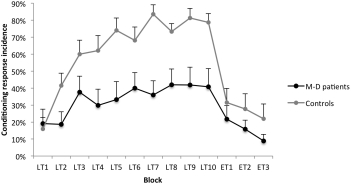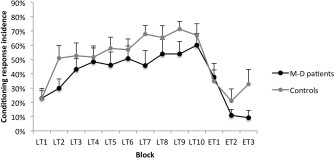Session Information
Date: Thursday, June 23, 2016
Session Title: Dystonia and Pediatric Movement Disorders
Session Time: 12:00pm-1:30pm
Objective: To investigate cerebellar learning and its modifiability by alcohol in SGCE mutation-positive M-D using eye blink conditioning (EBC).
Background: M-D is characterized by generalized myoclonic jerks and focal or segmental dystonia with a decrease of symptoms following alcohol intake. This effect has raised the question of whether the cerebellum plays a role in generating motor symptoms.
Methods: EBC was assessed in 13 SGCE mutation-positive M-D patients and 18 control subjects on day 1 before and on day 2 after a single oral ethanol dose, to reach a breath alcohol content of 0.8‰ (± 0.1‰). For the conditioning paradigm, an air puff applied to the eye canthus was preceded by a 540 ms tone, the conditioned stimulus, in 10 learning blocks each including 10 paired stimuli (LT1-LT10). The learning paradigm was followed by three extinction blocks (10 stimuli each), in which the single tone was given only (ET1-ET3). To test for differential effects, a multifactorial repeated-measures ANOVA was used with the factors STATE (OFF_C2 and ON_C2), BLOCK (LT1-10 and ET1-3) and the in-between subject factor GROUP (patient and controls).
Results: There was a significant main effect of the factor GROUP (F1;29) = 4.876, p = 0.035) and BLOCK (F12;348) = 21.728, p < 0.006) and an interaction of the factors STATE x GROUP (F1;29) = 8.800, p = 0.01) indicating that ethanol had a differential effect in M-D compared to controls (figure 1). Without the influence of alcohol M-D patients had a significantly lower learning effect (GROUP (F1;29) = 8.691, p = 0.06 and BLOCK (F9;261) = 14.697, p < 0.001) and an interaction of the factors BLOCK and GROUP (F9;261) = 2.335, p = 0.044) (figure 1a LT1-10). Although conditioning rates under the influence of alcohol did not significantly differ between groups (figure 1b), both groups showed a reverse effect comparing the learning effect before and after alcohol administration. While controls had lower conditioning rates under alcohol, M-D patients showed an increased eye blink conditioning rate under alcohol with a main effect of the factor STATE when assessing cerebellar learning before and after alcohol consumption (F1;12) = 10.039, p = 0.008).
Conclusions: Cerebellar learning is impaired in patients with SGCE mutation-positive M-D and alcohol administration improved this learning effect. Our study supports the idea of a critical role of the cerebellum in generating motor symptoms in M-D. 

To cite this abstract in AMA style:
A. Weissbach, E. Werner, T. Bäumer, D. Timmann, N. Brüggemann, V. Tadic, C. Klein, A. Münchau. Cerebellar learning and its modifiability by alcohol in myoclonus-dystonia [abstract]. Mov Disord. 2016; 31 (suppl 2). https://www.mdsabstracts.org/abstract/cerebellar-learning-and-its-modifiability-by-alcohol-in-myoclonus-dystonia/. Accessed February 3, 2026.« Back to 2016 International Congress
MDS Abstracts - https://www.mdsabstracts.org/abstract/cerebellar-learning-and-its-modifiability-by-alcohol-in-myoclonus-dystonia/
